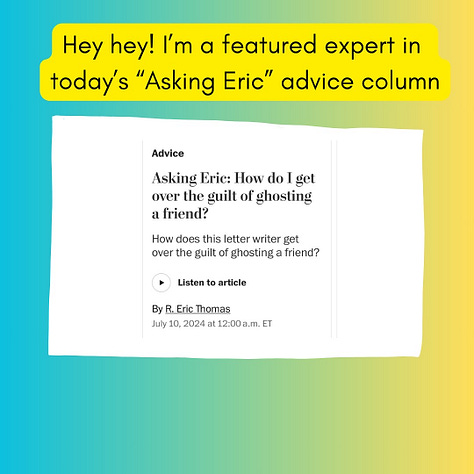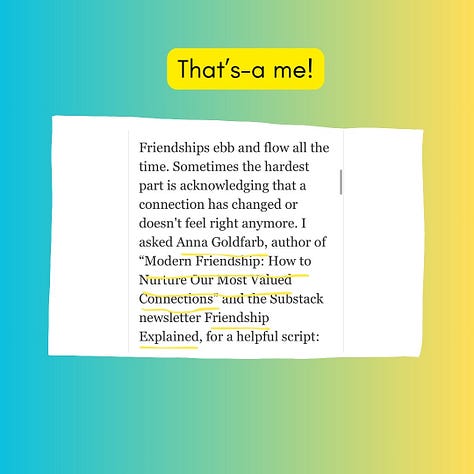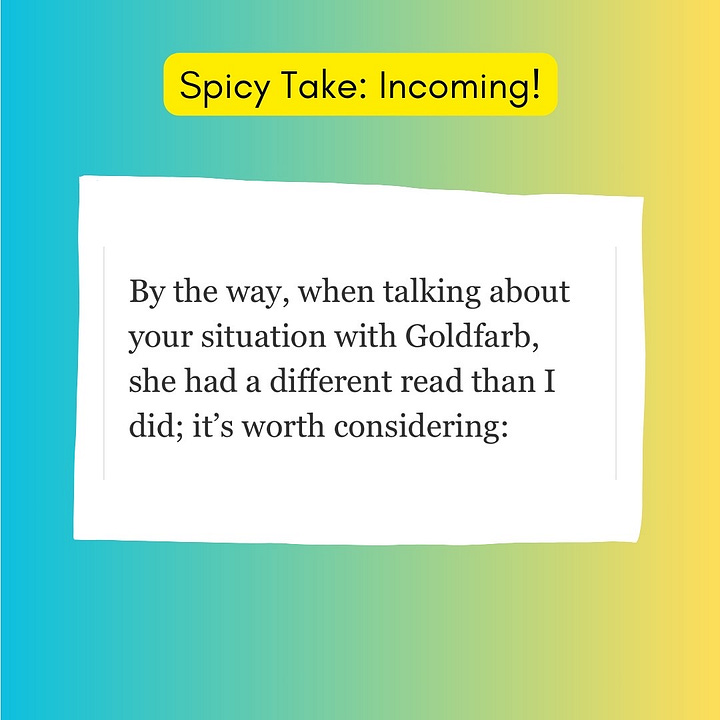After explaining how dysfunctional young people’s friendships are, Ms. India concludes that social media is a facade. She says we should to nurture friendships with those who know us beyond our profile pic:
My advice is keep whoever has the least interest in your social media. The ones who take your online persona the least seriously. They want the whole you, and they know an Instagram grid couldn’t possibly capture it. They like your ugly laugh, not the fake one you use for TikTok. They like those candid, silly pictures when you forgot to perform yourself for a moment, not the staged Instagram selfies that don’t even look like you. Even better—they cringe at that! Keep those people! The ones that aren’t afraid to laugh at you! That ground you when you get caught up in all this. That couldn’t care less about what’s on your Instagram Story but would come with you to the hospital if you called them at 3am. That don’t send you a DM but drive over when something comes along in life and floors you. Friends are those who will be there when life brings you to your knees.
But when friends contact me now, they contact me because they care—not because my Instagram Stories relentlessly remind them I exist. They remember my birthday not because Facebook nudged them but because they never forgot the date.
So I know who is worth keeping. I know who is real, and rare.
According to her, to identify a real and rare friend, we should focus on what friends do for us:
appreciate us
laugh with us
ground us
show up for us
be there for us
This is problematic because that kind of mindset is making you miserable.
If you’re tallying what friends have –– or haven’t –– done for you, you will be playing a dangerous game.
The reality is that lots of real and rare friends won’t be available to you at all times. That’s a high standard most people can’t live up to. What happens when your friend has a baby and can’t drive you to the hospital at 3am? Or when your friend loses their job (or a pet or a parent) and can’t lift you up in the moment?
She has it backwards. As humans, we’re not designed to passively be cared about; we’re designed to actively care for others.
The key to having more enduring friendships is to focus on other people:
appreciate them
laugh with them
ground them
show up for them
be there for them
That makes us feel amazing because love and belonging is one of our five basic, inherent genetic needs, along with survival, power, freedom and fun.
I wrote about this very thing in my new book Modern Friendship:
When it comes to friendship, I think most people imagine they’d be happier with a robust web of engaged friends. A 2019 study by researchers Suzanne Degges- White, professor at Northern Illinois University and author of Toxic Friendships: Knowing the Rules and Dealing with the Friends Who Break Them, and Marcela Kepic interviewed 422 women between the ages of 31 and 77 and examined how their friendships influence their life satisfaction.
They found that there were three main factors that were predictive of life satisfaction in midlife women:
(1) feeling younger than your chronological age
(2) enjoying a sense of belonging, and
(3) being someone’s best friend.They also found that having more frequent visits with friends, feeling satisfied with the number of one’s friends, and having a larger number of friends in general all imparted a higher level of life satisfaction. It makes perfect sense that having more friends in our network makes us happier. Numbers-wise, the study found that having three or more good friends was indicative of higher levels of life satisfaction.
However, you may be surprised to learn why it’s pleasurable to have a set of valued friends. Sure, it feels good to have someone to call and give us emotional support. But, as it turns out, being considered someone’s best friend really honed in on where the wonderful feelings emerge.
“Having a best friend doesn’t contribute to life satisfaction, but being someone’s best friend does,” Dr. Degges- White said. “Because a lot of times we think, ‘Well, I’ve got a best friend, so I’m good.’ But it’s really, ‘Does someone consider me their best friend?’
Someone considering you a best friend is a good measure of how giving and supportive you are, and it’s more likely to predict life satisfaction rather than saying, ‘I’ve got best friends I can count on,’” she said.
Why does it feel so good to be someone’s best friend? Because we’re biologically wired for it. Altruism — being concerned with other people’s welfare — is an evolutionary survival tool we developed in order to keep society chugging along. We’re hardwired to want to help others.
“When we do something nice for someone else, we get a hit of dopamine, and we get the good feels,” Dr. Degges- White said. “Being a good friend is going to feed us and nurture us and give us that positive reward. It’s not just so much having friends you can lean on, but being the friend that someone else can lean on that really feels good to us and makes us feel like we matter to other people.”
We all want to matter to the people in our lives. The way to do that is to support and care for them.
Yes, having friends we admire and love is great, but having wonderful, dynamic people consider us their best friend is an even more incredible feeling. That’s because we love feeling needed and that we belong. It makes us feel like we matter to others.
You know the best way to matter to people? CARE ABOUT THE THINGS THEY CARE ABOUT. Care about your friend’s job. Their family. Their hurdles, goals and dreams.
Show support, interest and love. Those people will be more likely keep you close. And it will feel incredible.
So, I disagree with Ms. India. The answer to solving friendship isn’t to notice who shows up for you; the answer is to find people you admire and love and SHOW UP FOR THEM. Be a wonderful teammate to a select few people who share your values. Take an interest in all the roles they play in their life. Honor their triumphs and challenges.
Deeply caring about other people outside of yourself is what brings true, lasting joy!
I was lucky enough to be an expert in a recent column of Asking Eric,
’s wonderful new syndicated advice column. I gave a spicy hot take about what we owe creepy acquaintances from our past.In the letter, a person is wracked with guilt over not responding to an aquaintance who reached out and asked how she was doing. She was really feeling like a horrible person over this.





There were a lot of dynamics I considered when giving my advice, which boiled down to: what do you owe a creepy guy who randomly texts you asking how you are? NOT MUCH, MMMMKAY.
Not everyone agrees with me! There’s a lot of activity in the 600 (!) comments. I attribute this chatter to a failure of language. Since the letter-writer called this person in her life a “friend,” people are projecting their own pain and hurt onto the situation and ascribing a closeness between them that I did not sense.
I’d love to know what you think! Tell me in the comments.
Speaking of comments, you can find me talking about friendship:
With Tawny Lara and Lisa Smith on Recovery Rocks
With Alexander Loewi on The Most Important Podcast
Here are three things I’m obsessed with:
America’s Sweethearts on Netflix. The hype is real. The show is riveting.
Trader Joe’s new sliced black truffle monterey jack cheese slices. With a few Triscuits, it’s a perfect snack. #chic
Glossier’s original formula lip balm in Wild Fig. LOVE.
Until next time, MMMMKAY,
Anna






You're shining a bright light on the "me, me, me" culture and it's fascinating to hear that you're getting so much push back. I guess not surprising, but disappointing. I hope you just keep on keeping on with more hot takes, Anna. It could take awhile for folks who were virtually born with social media in their faces to hear what you're saying... but the tide is turning. Being the friend, not having the friend is the only real home base we can create.
Wow, loved this one! BE the best friend, don't HAVE the best friend = genius. Keep up the spicy hot takes, Anna!